#ai app development
Text

Here’s my personal recommendation of a YouTube video to check out:
youtube
#ai#artificial intelligence#trans issues#trans is beautiful#ai app#ai app development#giggle#lgbt#lgbtqia#lgbtq community#lgbtqplus#lgbtqia+#lgbtq#trans inclusive radical feminism#leftist#leftism#left wing#leftist politics#left wing politics#socialist#socialism#communist#communism#political#political posting#politics#queer#queer community#spreading awareness#tumblr recommendations
19 notes
·
View notes
Text
Android App Development: Building Your First Mobile App - A Step-by-Step Guide for Beginners
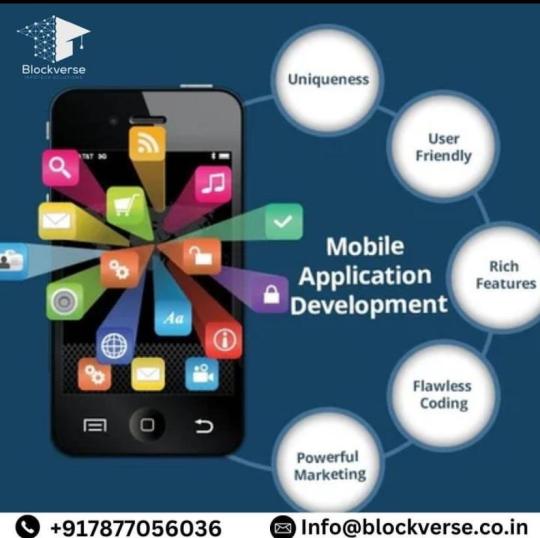
In the ever-evolving landscape of web development, crafting designs that seamlessly adapt to various screen sizes has become imperative. Among the key elements of web design, typography plays a pivotal role in conveying the intended message effectively. As users access websites across a myriad of devices, ensuring that typography adjusts gracefully to different screen sizes is crucial for delivering a consistent and user-friendly experience.
At Blockverse Infotech Solutions, we understand the significance of responsive typography in modern web design. In this article, we delve into the fundamentals of responsive typography and share essential tips and techniques to help you create text that adapts flawlessly to the diverse array of devices used by your audience.
Use Relative Units: Embrace relative units such as percentages, ems, or rems instead of fixed pixel sizes for font properties like size, line height, and spacing. Relative units ensure that typography scales proportionally based on the user’s viewport size, facilitating a consistent reading experience across devices.
Viewport-based Typography: Leverage viewport units (vw, vh) to define font sizes relative to the dimensions of the viewport. This approach enables typography to adjust dynamically, maintaining optimal legibility regardless of the screen dimensions.
Media Queries for Typography: Utilize media queries to tailor typography styles based on specific breakpoints corresponding to different device sizes. Adjust font sizes, line heights, and other typographic parameters within media query blocks to optimize readability across various screen resolutions
Hierarchical Scaling: Establish a hierarchical typographic scale consisting of relative font size increments for different heading levels and text elements. By maintaining consistent proportions between typography elements, you ensure visual harmony and readability across all screen sizes.
Optimize Line Length: Pay attention to line length — the number of characters per line — to prevent excessively long or short lines of text. Aim for an optimal line length that promotes comfortable reading without excessive eye movement, adjusting it dynamically for different viewport widths.
Contrast and Readability: Prioritize contrast and readability by selecting font colors and backgrounds that ensure sufficient contrast ratios, especially on smaller screens or in high ambient light conditions. Test typography legibility across diverse devices and environments to guarantee optimal readability.
Fallback Fonts and Typography Stacks: Define robust font stacks incorporating web-safe fonts and appropriate fallback options to maintain typographic consistency across platforms. Specify font fallbacks in CSS declarations to ensure graceful degradation in case primary fonts are unavailable.
Responsive Type Scale Tools: Explore responsive type scale tools and resources that facilitate the generation of typographic scales optimized for responsiveness. Leverage online calculators and frameworks to streamline the creation of scalable typography systems tailored to your design requirements.
User Testing and Iteration: Conduct thorough user testing across various devices and screen sizes to evaluate the effectiveness of your responsive typography implementation. Gather feedback from users regarding readability, legibility, and overall typographic experience, iteratively refining typography styles based on insights gleaned from testing.
In the realm of web design, responsive typography serves as a cornerstone for crafting engaging and accessible user experiences across diverse devices. By employing the tips and techniques outlined in this article, you can elevate your typographic design prowess and ensure that text content adapts seamlessly to the ever-changing digital landscape. At Blockverse Infotech Solutions, we empower businesses with innovative web design solutions that prioritize responsiveness and user-centricity, including meticulous attention to typography for enhanced readability and visual appeal.
#mobile phone app development#android app development#cost to develop an app#website app development#build a game app#freelance app developers#ecommerce app development#angular mobile app development#front end app development#app developers in jaipur#app development company in jaipur#application development technologies#ai app development
0 notes
Photo
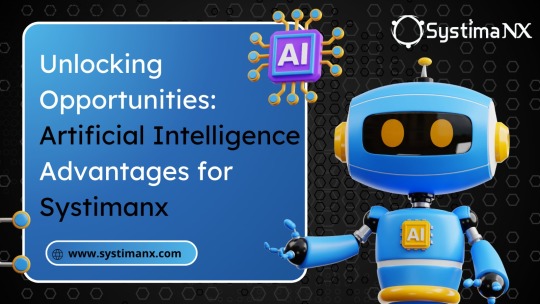
(via https://imgur.com/gallery/4Oo9WCi)
Unlocking Opportunities: Artificial Intelligence Advantages for Systimanx
"Unlocking Opportunities: #Systimanx leverages artificial intelligence to enhance efficiency and deliver personalized user experiences across its software solutions. With AI-driven insights and automation, Systimanx gains a competitive edge, driving innovation and ensuring high-quality software products.
#aisolutions#aisolutionsdevelopment#mobile app development#mobile app developer company#app developing company#app developers#ai app development
0 notes
Text
Mobile App Development Services
Native Mobile App Development: Develop cutting-edge applications for iOS and Android using specialized expertise in native development for optimal performance.
Hybrid Mobile App Development: Blend web efficiency with native power, creating versatile apps for diverse platforms and audiences.
Progressive Web App Development: Future-proof your app with seamless, fast, and engaging experiences across devices and platforms.
Wearables and Embedded Software: Extend your app’s reach to smartwatches, fitness trackers, and embedded systems for seamless connectivity.
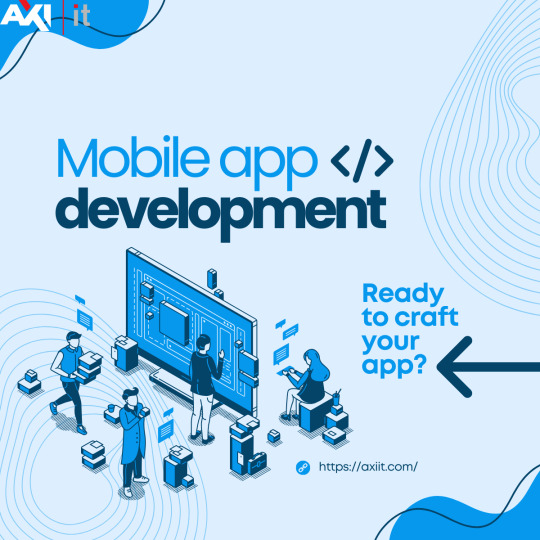
iOS App Development: Custom-made iOS apps align with Apple’s design principles, delivering a delightful user experience.
Android App Development: Capture the vast Android user base with consistent, user-friendly apps for smartphones and tablets.
#app development#mobile app development#ios development#app development course#web development#mobile development#app development for beginners#app developer#android development#mobile app developer#ai app development#swift app development#ios 11 app development#fiverr app development#hybrid app development#native app development#python app development#chatgpt app development#app development in hindi#app development roadmap#app development in india
0 notes
Text
The Impact of AI and Machine Learning on Mobile App Development
In the dynamic landscape of mobile app development, the integration of artificial intelligence (AI) and machine learning (ML) has emerged as a transformative force, reshaping the way we interact with and experience mobile applications. From personalized recommendations to predictive analytics, AI and ML technologies are revolutionizing user experiences and empowering developers to create smarter, more intuitive apps. In this article, we delve into the profound impact of AI and ML on mobile app development.
Enhanced User Personalization:
One of the most significant benefits of AI and ML in mobile app development is the ability to deliver personalized experiences tailored to individual users. By analyzing vast amounts of data, including user behavior, preferences, and contextual information, AI-powered algorithms can accurately predict user preferences and offer personalized recommendations. Whether it's suggesting relevant content, products, or services, AI-driven personalization enhances user engagement and fosters long-term customer loyalty.
Predictive Analytics and Insights:
AI and ML algorithms enable mobile apps to anticipate user needs and behaviors through predictive analytics. By analyzing historical data patterns, these algorithms can forecast future trends, user actions, and outcomes with remarkable accuracy. This invaluable insight empowers businesses to make data-driven decisions, optimize resource allocation, and tailor marketing strategies to target specific user segments effectively. From predicting customer churn to forecasting product demand, predictive analytics powered by AI and ML drive business growth and competitiveness in the mobile app market.
Natural Language Processing (NLP) and Conversational Interfaces:
Advancements in NLP and conversational AI have revolutionized the way users interact with mobile apps. From chatbots and virtual assistants to voice-enabled interfaces, AI-powered conversational interfaces enable seamless and intuitive communication between users and applications. By understanding and processing natural language inputs, these interfaces can provide personalized assistance, answer queries, and perform tasks on behalf of users. Whether it's booking a ride, ordering food, or scheduling appointments, conversational AI enhances user convenience and efficiency, driving greater adoption and engagement with mobile apps.
Image and Speech Recognition:
AI and ML technologies have enabled remarkable advancements in image and speech recognition capabilities within mobile apps. Through deep learning algorithms, mobile apps can accurately identify objects, faces, and scenes in images, enabling innovative features such as augmented reality (AR) filters, visual search, and photo editing tools. Similarly, speech recognition technology enables hands-free interaction with mobile apps, allowing users to dictate messages, search for information, and control app functions using voice commands. These capabilities enhance user accessibility, convenience, and immersion, opening up new possibilities for creative expression and functionality in mobile apps.
Automated Testing and Quality Assurance:
AI and ML-powered automation have streamlined the mobile app development lifecycle, particularly in the realm of testing and quality assurance (QA). Automated testing tools leverage AI algorithms to analyze app performance, identify bugs, and predict potential issues across various devices and platforms. By significantly reducing testing time and resources, automated QA processes enable developers to deliver high-quality, bug-free mobile apps faster and more efficiently. This not only enhances the overall user experience but also improves developer productivity and time-to-market.
Conclusion:
The integration of AI and machine learning technologies is revolutionizing the mobile app development landscape, empowering developers to create smarter, more intuitive, and personalized experiences for users. From enhanced user personalization to predictive analytics, conversational interfaces, image and speech recognition, and automated testing, AI and ML are driving innovation and reshaping the future of mobile app development. As these technologies continue to evolve, their impact on mobile app experiences and the broader digital ecosystem is poised to grow exponentially, offering immense opportunities for businesses and developers alike to innovate and thrive in a rapidly evolving marketplace.
0 notes
Text
How to Use AI to Detect and Prevent Cyber Attacks on Your App?
This in-depth blog explores how artificial intelligence is transforming mobile app security. Learn how AI app development techniques including behavioral analytics, malware detection through machine learning models, AI-powered code auditing, and threat intelligence sharing can help developers proactively detect and prevent cyber attacks on their mobile apps in real-time. Discover how integrating leading AI-based app development security solutions into the mobile app development lifecycle allows for creating robust protection for users, data, and reputation against constantly evolving mobile threats.
0 notes
Text
AI Tool for App Development: Code-Free Wonders with AI
This blog will discuss how to make an app without coding. And some AI tool for app development. More detail 👇
1 note
·
View note
Text
Artificial Intelligence Development bringing out endless possibilities from any situations...

Artificial Intelligence (AI) is increasingly being integrated into mobile apps to enhance user experiences, provide personalized content, and improve overall functionality. In this saga of innovation, leading companies are not merely participants; they are orchestrators, orchestrating a symphony of technological prowess and AI acumen that resonates across industries through the artificial intelligence in mobile apps.
Their success is not just in adapting to change but in shaping the narrative of what's possible. It's a world where existence is synonymous with evolution, and the path to leadership is paved with a relentless pursuit of excellence in the face of ever-advancing technologies and the transformative embrace of artificial intelligence. Here are several ways AI is utilized by the mobile app developers in India:
1. Recommendation Engines:
Apps use AI to analyze user preferences and behaviors to recommend products, services, or content, creating a more tailored user experience.
2. Augmented Reality (AR) and Virtual Reality (VR):
AI plays a significant role in AR and VR applications on mobile devices, enhancing the realism and interactivity of virtual experiences.
3. Natural Language Processing (NLP):
NLP is employed in mobile apps for language understanding, sentiment analysis, and language translation, enabling more sophisticated communication and language-related tasks.
4. Security Enhancements:
AI-based security features, such as facial recognition, fingerprint scanning, and behavior analysis, contribute to enhanced mobile device security.
5. Location-Based Services:
AI algorithms analyze location data to offer personalized recommendations, location-based notifications, and improved mapping and navigation services.
6. Predictive Analytics:
AI-driven predictive analytics help mobile apps anticipate user needs, such as predicting the next action a user might take or suggesting optimal routes in navigation apps.
7. Emotion Recognition:
Some apps use AI to recognize and respond to user emotions, providing a more emotionally intelligent interaction.
8. AI-powered Games:
AI algorithms are used to create intelligent and adaptive game environments, opponents, and challenges in mobile gaming applications.
#artificial intelligence in mobile apps#mobile app developers in india#ai app development#ios app development#android app development
1 note
·
View note
Text
5 Mobile App Trends to Rule 2024: VGD Technologies Predicts the Future!
Hey there, app enthusiasts! At VGD Technologies, we're always ahead of the curve, crafting cutting-edge mobile experiences that push the boundaries. So, we thought we'd share our insights on the 5 hottest trends set to revolutionize the mobile app world in 2024. Buckle up, because things are about to get exciting!
1 note
·
View note
Text
Challenges and Solutions: Overcoming Obstacles in AI Mobile App Development

In today's dynamic digital landscape, the role of artificial intelligence (AI) in mobile app development has surged to the forefront. The growing importance of AI stems from its transformative capabilities, enhancing everything from user experiences to app functionality.
AI-powered algorithms and machine learning models enable apps to understand user behavior, predict preferences, and deliver personalized content, creating a more engaging and user-centric environment.
Moreover, AI-driven chatbots and virtual assistants have revolutionized customer support, offering efficient and round-the-clock assistance.
As businesses increasingly rely on mobile apps as a primary means of engaging with their audience, harnessing the potential of AI has become not just a competitive advantage but a necessity.
In this ever-evolving landscape, staying ahead means embracing AI in mobile app development to unlock innovation, efficiency, and unparalleled user satisfaction.
Challenges in AI App Development
Data Quality and Quantity
AI apps heavily rely on vast datasets for training and decision-making. One major challenge is ensuring access to high-quality, relevant data, and collecting enough of it to train AI models effectively.
Algorithm Complexity
Developing complex AI algorithms that can provide meaningful insights and predictions is a challenge. Balancing accuracy and performance while avoiding overfitting is crucial.
Resource Intensiveness
AI app development often requires significant computational resources, making it resource-intensive and potentially expensive, which can be a hurdle for smaller businesses.
Privacy and Security Concerns
With the increasing use of AI, data privacy and security concerns have risen. Ensuring compliance with data protection regulations and safeguarding sensitive information are paramount.
Integration and Compatibility
Integrating AI into existing apps or ecosystems can be complex, as it may require changes to existing infrastructure and ensuring compatibility with other software and platforms.
Talent Shortage
Finding skilled AI developers and data scientists can be challenging, given the high demand for their expertise. Recruiting and retaining talent is a persistent issue.
Ethical Considerations
Addressing ethical issues related to AI, such as bias in algorithms, transparency, and fairness, is essential to avoid reputational damage and legal complications.
Continuous Learning
AI models require continuous learning and updates to stay effective. Managing and maintaining AI systems post-launch can be a long-term challenge.
User Adoption
Convincing users to trust and adopt AI-powered apps can be a hurdle, especially when they are unfamiliar with AI technology or have concerns about its impact.
Competition and Innovation
Keeping up with the rapid pace of AI development and staying ahead of competitors is a perpetual challenge in this ever-evolving field.
By addressing these challenges effectively, businesses can harness the power of AI in app development while ensuring a competitive edge in the digital landscape.
Solutions to Overcome the Obstacles in AI Mobile App Development
Data Management
To tackle data challenges, start by identifying and curating high-quality datasets. Utilize data cleaning and augmentation techniques to enhance data quality. Collaboration with third-party data providers can also supplement your dataset.
Algorithm Optimization
Streamline algorithm development by leveraging pre-built AI frameworks and libraries. Focus on fine-tuning and optimizing existing algorithms rather than reinventing the wheel to balance complexity and performance.
Cost-Efficiency
To manage resource-intensive tasks, consider cloud-based AI services that offer scalability without the need for significant upfront investment. Explore open-source AI tools to reduce development costs.
Privacy and Security
Prioritize security and privacy in AI app development by implementing encryption, access controls, and compliance with data protection regulations. Regular security audits and updates are crucial.
Integration Solutions
Ensure seamless integration by using API-driven AI services and middleware. Test the app across various platforms and devices to guarantee compatibility and user experience consistency.
Talent Development
Invest in training and upskilling your existing team or partner with AI development experts. Collaboration with educational institutions or hiring remote talent can help address the talent shortage.
Ethical Frameworks
Implement ethical AI guidelines and best practices to address bias and transparency concerns. Regularly review and update AI models to improve fairness and accountability.
Continuous Learning and Updates
Develop a strategy for continuous AI model improvement and maintenance post-launch. Automated feedback loops and monitoring systems can aid in ongoing optimization.
User Education
Educate users about the benefits and safety measures of AI-powered apps through clear and transparent communication. Highlight the value added by AI features and address any concerns.
Innovation Culture
Foster a culture of innovation within your organization to stay competitive. Encourage experimentation and collaboration to keep pace with evolving AI technologies.
By implementing these solutions, businesses can navigate the challenges of AI mobile app development effectively, ensuring the successful integration of AI while staying ahead in the competitive mobile app market.
How can Scrum Digital help you in overcoming Obstacles in AI Mobile App Development?
Scrum Digital stands out as a leading ally in overcoming obstacles in AI mobile app development, providing tailored solutions that prioritize innovation, efficiency, and success. With a dedicated team of seasoned AI developers and data scientists, Scrum Digital addresses the talent shortage challenge head-on, bringing expertise and experience to the table.
By harnessing AI frameworks, pre-built models, and cloud-based services, they optimize development, ensuring cost-efficiency without compromising quality. Moreover, Scrum Digital's commitment to data privacy and security guarantees compliance with regulations, safeguarding user trust.
Their ethical Fs tackle bias and transparency issues, promoting fair and accountable AI practices. Through continuous learning and updates, Scrum Digital maintains AI models at their peak performance, delivering apps that evolve with the ever-changing AI landscape.
By partnering with Scrum Digital, businesses gain a competitive edge, as their apps seamlessly integrate AI, captivate users, and thrive in the dynamic mobile app market.
0 notes
Text
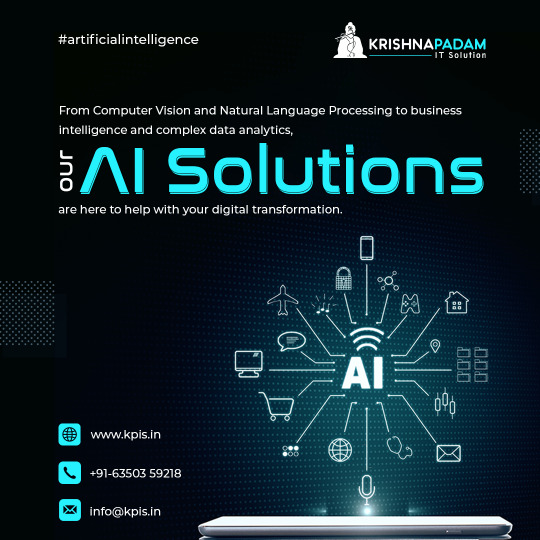
𝐀𝐑𝐓𝐈𝐅𝐈𝐂𝐈𝐀𝐋 𝐈𝐍𝐓𝐄𝐋𝐋𝐈𝐆𝐄𝐍𝐂𝐄 is rapidly developing and playing an essential role in business intelligence (BI) and analytics in today’s data-driven business prospect. With advanced capabilities in data collection, analysis, and decision-making, #ai has the potential to transform how businesses approach data-driven strategies.
𝐀𝐈 𝐀𝐏𝐏 𝐃𝐄𝐕𝐄𝐋𝐎𝐏𝐌𝐄𝐍𝐓 𝐒𝐄𝐑𝐕𝐈𝐂𝐄𝐒 are valuable in different industries, including #healthcare, #finance, #ecommerce, #manufacturing, transport, #customerservice, #marketing, #cybersecurity, and many more. With AI-driven applications, businesses can streamline operations, enhance productivity, and provoke growth.
𝐎𝐔𝐑 𝐀𝐑𝐓𝐈𝐅𝐈𝐂𝐈𝐀𝐋 𝐈𝐍𝐓𝐄𝐋𝐋𝐈𝐆𝐄𝐍𝐂𝐄 𝐒𝐄𝐑𝐕𝐈𝐂𝐄𝐒:
🔻 Deep Learning
🔺 Computer Vision
🔻 Machine Learning
🔺 Predictive Analytics
🔻 Custom AI Solutions
🔺 AI Conversational Tools
🔻 Natural Language Processing
Our team develops digital artificial intelligence (AI) solutions from the ground up or incorporates them into existing business systems using predictive analytics tools. We transform legacy and extensive data into reusable datasets for multi-label category, regression, and gathering before deploying the prototypes. With our AI development services, you can combine Artificial Intelligence into your existing products to speed up the decision-making technique.
Would you like to understand how #kpis helps you to achieve your AI visions? Contact us today to understand more about 𝐀𝐈 𝐃𝐄𝐕𝐄𝐋𝐎𝐏𝐌𝐄𝐍𝐓 𝐒𝐄𝐑𝐕𝐈𝐂𝐄𝐒, and let us be your partner in optimising operational effectiveness and improving customer experience.
🔊𝐆𝐞𝐭 𝐢𝐧 𝐓𝐨𝐮𝐜𝐡 𝐖𝐢𝐭𝐡 𝐔𝐬🔊
➖➖➖➖➖➖➖➖
🌐 𝐕𝐢𝐬𝐢𝐭: https://www.kpis.in/ai-development-company
📧 𝐄𝐦𝐚𝐢𝐥: [email protected]
📞 𝐂𝐨𝐧𝐭𝐚𝐜𝐭: +91-6350359218
➖➖➖➖➖➖➖➖
#artificial intelligence#ai app development#machine learning#deep learning#computer vision#natural language processing#ai solutions#ai services#chatbot#ai technology#iot app development#iiot#information technology#app development#mobile device management#mobile app development company#web development#game development company#technology#application development#software development company
0 notes
Text

The Scale of the Generative AI App Market :-
42% of the Global Market Share was Accounted by the North America Region in 2022.
➢ The Market Valuation was USD 8.65 Billion in 2022
➢ A Compound Annual Growth Rate (CAGR) of 36.10% over the forecast period from 2023 to 2032.
Read this Full Article :
#anviamsolutions#software development#business#trending2023#anviam#blockchain#digitalmarketing#software company#app development#app developers#flutter app development#work culture#work in progress#artificial intelligence#daily update#ai applications#ai generated#ai app development#growth
0 notes
Text
Create your own AI app in seconds with no code with Mindstudio.MindStudio is a cloud-based AI development platform that enables users to create AI-enabled applications for multiple use cases.
https://get.youai.ai/qc4w8t333n1d
#ai#ai generated#artificially generated#artificial intelligence#foryou#innovation#technology#ai app development#ai app#ai applications#ai appmaker review
0 notes
Text
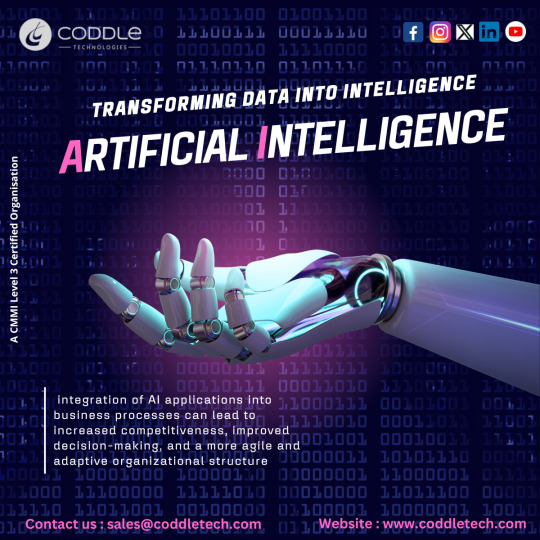
Coddle Technologies offers cutting-edge Artificial Intelligence development services, tailored to transform your organization into an AI-driven powerhouse.
Our team of expert AI developers is ready to collaborate with you to create intelligent solutions that streamline processes, enhance efficiency, and drive innovation.
Contact us today to schedule a consultation and let's embark on an exciting AI development journey together!
0 notes
Text
Cross-Platform App Development
Explore the dynamic world of mobile app development in Bangalore with this insightful article on "Cross-Platform App Development: A Cost-Effective Solution for Bangalore Businesses." 🌐💡
Discover how businesses can save up to 30% on app development costs, achieve a faster time-to-market, and enhance user experiences across diverse devices. 📈📱
🔗 Read Article Here
Kudos to 5ine, a prominent player in Bangalore's app development scene, for their expertise in leveraging frameworks like React Native and Flutter!
0 notes
Text
How to Use AI to Detect and Prevent Cyber Attacks on Your App?
In our technology driven world today, mobile applications have become deeply integrated into our daily lives. However, this also means that mobile apps have become attractive targets for cybercriminals aiming to steal sensitive user data or take control of devices. As AI app development solutions continue to process and store increasing amounts of confidential data, it has become crucial for developers to prioritize app security.
Fortunately, recent advancements in artificial intelligence (AI) and machine learning are enabling innovative techniques to protect mobile apps against cyber threats.
In this post, we will take a deeper look at how AI based app development solutions can be leveraged to detect and prevent cyber attacks on mobile apps.
Real-Time Threat Detection with AI
One of the biggest challenges in cybersecurity is being able to identify threats and anomalies as they occur, before any damage can be inflicted. Traditional rule-based security systems often lack the sophistication to catch new attack methods and zero-day exploits. AI-based app development solutions are able to autonomously analyze various app activities and user behaviors to detect malicious activities in real-time.
Some of the techniques enabled by AI to enhance real-time threat detection include:
Behavioral analytics, where AI app development models baseline normal app and user activity patterns during a training period. Significant deviations from established normal patterns are then flagged as signals to identify potential attacks or unauthorized access attempts. By continuously adapting to evolving app and user behavior trends, behavioral analytics can identify even minor anomalies that rules-based systems would miss.
Network traffic analysis via AI based app development examines inbound and outbound app network traffic in real-time to detect communication anomalies and connections to known malicious servers. This allows early detection of data exfiltration attempts, malicious bots, and other attack traffic that may be obfuscated.
Monitoring user activities with artificial intelligence app development systems can uncover account misuse, abnormal behavior flows, credential stuffing, and other signals that indicate account takeover attacks. Analyzing access patterns, geospatial activities, and other user behavior can provide full context to detect compromised accounts.
Malware and Malicious App Detection with AI
Malicious apps infected with malware continue to bypass traditional signature-based anti-virus protections and penetrate app stores. AI and machine learning offer more robust techniques to detect malicious apps:
Static analysis uses ML models trained to analyze app code, binaries, metadata, and configuration files for patterns that suggest obfuscation, vulnerability injection, and other malicious coding techniques. AI-based app development static analysis can identify subtle indicators that may evade traditional static analyzers.
Dynamic analysis relies on AI app development to simulate app execution and user workflows in isolated sandboxes. This allows detecting malicious behavior without launching apps on production devices. Artificial intelligence app development solutions can generate relevant app simulation scenarios to uncover actions that activate dormant malicious code.
Analyzing app metadata such as descriptions, developer profiles, and user reviews with natural language processing algorithms can detect patterns that act as signals to uncover potentially malicious apps. This allows app stores to quickly identify suspicious apps for further testing before they are released.
Securing App Code with AI-Powered Tools
Fixing vulnerabilities in the source code is a high priority for closing off major attack vectors. AI-based app development code scanning tools equip developers to find and remediate security flaws efficiently:
AI app development systems can be customized to scan codebases for vulnerabilities that are specific to mobile app platforms and frameworks, such as SQL injection, remote code execution, insecure data storage, etc. This allows more precise identification of vulnerabilities that pose actual risks.
Intelligent code auditing enabled by artificial intelligence in mobile app analyzes code in context to provide insights into the root causes behind vulnerabilities. This allows developers to prioritize remediation based on true risks rather than just severity scores.
App hardening techniques can be automated using AI app development to inject additional code that limits over privileged access, strengthens input validation, and adds runtime protections to high-risk code areas. This reduces the effort needed to manually implement app hardening.
Overall, AI-based app development tools allow developers to find and fix security flaws faster while complementing human code auditing and penetration testing efforts.
The Future of AI in Mobile App Cybersecurity
As hackers continue to evolve their techniques, AI and machine learning will become indispensable to the future of mobile app security. Automating time-consuming security processes with AI allows developers to focus their efforts on building innovative app features, while ensuring protections against emerging cyber threats.
Leading cybersecurity solution providers are already offering AI-based app development systems that can detect threats early, identify high-risk users and devices, and fix vulnerabilities automatically before apps are launched. Integrating such solutions is becoming critical for developers to maintain robust security postures throughout the mobile app lifecycle.
Looking ahead, we can expect even tighter integration between mobile app platforms, AI security tools, and collective threat intelligence powered by machine learning across millions of apps. With mobile apps now at the forefront of cyber risk management, AI based app development solutions will play an instrumental role in transforming how mobile app security is managed in the coming years.
As a leading mobile app development company, Consagous Technologies helps clients integrate cutting-edge AI cybersecurity capabilities into their mobile apps. Our AI based app development experts can assess your unique risks, implement proven AI security solutions, and provide ongoing management to combat emerging mobile threats.
Get in touch with our team today to discuss an AI-based app development approach tailored to securing your mobile app users, data, and reputation against cyber attacks.
0 notes